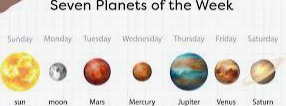Interesting history on the days of the week

January 31, 2023
Whether you believe it is Sunday through Saturday or Monday through Sunday, there is no denying that it is still a total of 7 days. The Romans not only named the months of the year but also the days of the week.
The Latin names for the 5 known planets at the time, the sun, and the moon were used by the ancient Romans to name the days. The Romans also named the planets after their gods.
The English names reflect the influence of the Anglo-Saxons and other Germanic peoples’ gods.
Monday was named after the Romans after the moon. It was known as “Moon’s Day”. The Latin name for Monday is “dies Lunae”.
Tuesday came from Old English tīwesdæg, which meant “Tiu’s day”. The Latin name for Tuesday was “dies Martis”.
Wednesday came from the Anglo-Saxon king of the gods, Woden. The name is “Wodnesdaeg” in Saxon and that is why Wednesday is spelled that way. The Latin name for Wednesday is “dies Mercurii”. The Roman god Mercury was the god of commerce and messages.
Thursday was named “Thor’s day”. In Norse mythology, Thor was the god of thunder. The Latin name for Thursday was “dies Jorvis”.
Friday was named after the Old English frīġedæġ, which means “day of Frig”. It came from an old conversation associating the Germanic goddess Frigg with the Roman goddess Venus. The Latin name for Friday is “dies Veneris”.
Saturday was named by the Romans after Saturn. Saturn was also the name of the Roman god of fun and feasting in Roman mythology. The Latin name for Saturday is “dies Saturni.”
Sunday was named after the Sun, hence why it is “Sun’s Day”. The Latin name for Sunday is “dies Solis.”
Some of the Spanish versions of the days reflect the Latin version like how lunes probably came from Lunae or martes from Martis.












